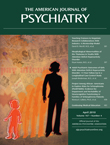To the Editor: We would like to thank Verinder Sharma M.B., B. S., et al. (1) for their clinically relevant article on bipolar II postpartum depression, published in the November 2009 issue of the Journal. The authors underlined the importance of screening for postpartum hypomanic symptoms in women with postpartum depression but only briefly mentioned the fact that psychotic symptoms might provide a clue for the bipolar nature of the episode.
In our opinion, the authors' assertions need to be formulated more strongly, since we follow the view that psychotic depression with an onset within 4 weeks of the postpartum period should be considered bipolar depression, even in the absence of hypomanic symptoms earlier in the period, as reflected by our case series (unpublished data available upon request from Bergink et al).
From 2005 to the present, we have diagnosed women with postpartum depression referred to the Mother-Child Unit of the Erasmus Medical Centre in Rotterdam, the Netherlands. Diagnoses are determined using the Structured Clinical Interview for DSM-IV Axis I Disorders (2), and patients are screened for hypomanic symptoms using the Mood Disorder Questionnaire (3).
We found that hypomanic symptoms (or a mixed state) occurred immediately in the postpartum period in 11 patients, and these patients were treated with mood stabilizers and/or antipsychotics. However, we also decided to treat seven patients without hypomanic symptoms (or a history of hypomanic symptoms) with mood stabilizers. These seven patients were diagnosed with a major depressive episode with psychotic features and an onset of symptoms within 4 weeks of the postpartum period. Of these, six were treated with lithium and antipsychotics and one refused treatment. For all except one woman, the depression went into complete remission. The one patient who did not respond to treatment with lithium and antipsychotics received ECT, and her depression subsequently remitted.
We do not know what would have happened if we had treated these seven women with antidepressants, but in our opinion antidepressant treatment could have put these patients at an unacceptable risk for exacerbation of symptoms. Similar to Dr. Sharma et al. (1, 4), we also have the clinical experience to be mindful that antidepressants should be used cautiously in the postpartum period. Over the last 4 years, eight postpartum patients were referred to our clinic as a result of very unstable illness course (manic and psychotic symptoms) after treatment with antidepressants.
Based on our clinical experience, we would recommend following the guidelines for treatment of bipolar II depression in patients with depression with psychotic features and acute onset during the postpartum period, even in the absence of hypomanic symptoms immediately postpartum or of a history of hypomania.

